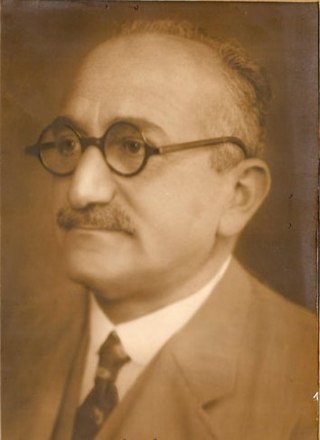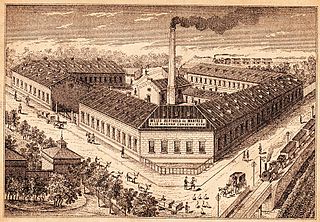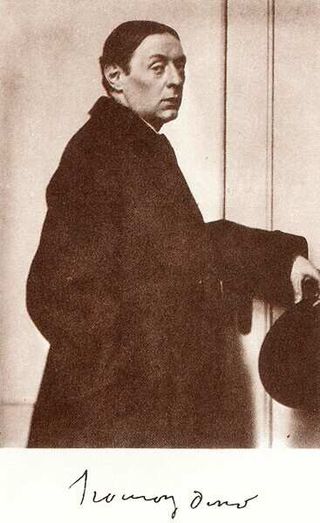Related Research Articles

The King of Hungary was the ruling head of state of the Kingdom of Hungary from 1000 to 1918. The style of title "Apostolic King of Hungary" was endorsed by Pope Clement XIII in 1758 and used afterwards by all Monarchs of Hungary.

Ferencvárosi Torna Club, commonly known as Ferencváros, Fradi, FTC or Kinizsi is a Hungarian professional football club based in Ferencváros, Budapest, that competes in the Nemzeti Bajnokság I, the top flight of Hungarian football. Ferencváros was founded in 1899 by Ferenc Springer and a group of local residents of Budapest's ninth district, Ferencváros. Ferencváros is best known internationally for winning the 1964–65 edition of the Inter-Cities Fairs Cup after defeating Juventus 1–0 in Turin in the final. Ferencváros also reached the final in the same competition in 1968, when they lost to Leeds United, as well as the final in the 1974–75 season of the European Cup Winners' Cup, losing to Dynamo Kyiv.

Miksa Fenyő was a Hungarian writer and intellectual, served as a member of parliament in the early 1930s, and was appointed as a Minister of Trade and Commerce under the short-lived government cabinet of Prime Minister János Hadik in 1918.

Magyar Testgyakorlók Köre is a multi-sports club from Budapest, founded in 1888. It has sections for football, handball, basketball, volleyball, futsal, ice hockey, water polo, cycling, gymnastics, athletics, fencing, canoeing, boxing, wrestling, swimming, rowing, karate, taekwondo, sailing, speed skating, skiing, table tennis, tennis and chess.

Lipót Fejér was a Hungarian mathematician of Jewish heritage. Fejér was born Leopold Weisz, and changed to the Hungarian name Fejér around 1900.

Sándor Bródy was a Hungarian author and journalist.

Bernhard Friedmann, or Friedmann Bernát was a Hungarian Jewish jurist and criminal lawyer.

Trnovec nad Váhom is a village and municipality in Šaľa District, in the Nitra Region of south-west Slovakia.
Weisz is a Hungarian surname of German and Jewish origin. Notable people with the surname include:

Richárd Weisz was a Hungarian heavyweight Greco-Roman wrestler. He competed at the 1906 Intercalated Games and at the 1908 Summer Olympics and won a gold medal in 1908.

Therese Csillag, or Hungarian: Teréz Csillag, Csillag Teréz, born Stern; August 17, 1859 in Duna-Adony – July 9, 1925 in Budapest) was a Hungarian Jewish actress.
Pester Lloyd is a German-language online daily newspaper from Budapest, Hungary with a focus "on Hungary and Eastern Europe".

Árpád Weisz was a Hungarian Olympic football player and manager. Weisz was Jewish, and was murdered with his wife and children by the Nazis during the Holocaust in World War II at Auschwitz.

Ferenc Weisz was a Hungarian football player and manager. Weisz, who was Jewish, played club football as a striker for Ferencváros and MTK, winning the Hungarian league nine times. He also represented his country at international level, earning 17 caps between 1903 and 1917. After retiring as a player in 1920, Weisz became manager of Újpest between 1920 and 1922.

István Stadinger is a Hungarian former communist politician, who served as Speaker of the National Assembly of Hungary between 1988 and 1989, until his resignation. He retired from the politics after 1990.

The Weiss Manfréd Acél- és Fémművek, or colloquially Csepel Művek was one of the largest machine factories in Hungary, located on Csepel island in the southern part of Budapest, founded in 1892. It was the second largest industrial enterprise in the Austro-Hungarian Monarchy, and the biggest industrial enterprise in the Hungarian half of the Empire. It played an integral role in the heavy industry and military production of the Austro-Hungarian Monarchy. Founded by Baron Manfréd Weiss of Csepel, an industrialist of Jewish origin, by the time of World War I the company was one of largest defense contractors in Austria-Hungary, producing all types of equipment, from airplanes and munitions to automotive engines, bicycles Csepel bicycle and cars. Badly damaged by Allied air raids and eventually pillaged during World War II, the company continued in existence until 1950, when it was nationalised and renamed to Rákosi Mátyás Vas- és Fémművek.

Peter, son of Töre was a Hungarian lord, who served as judge royal in 1198, during the reign of King Emeric.

Dezső Szomory was a Hungarian Jewish writer and dramatist. In his history plays and other works, he developed a unique tone and style of Budapest Hungarian; his work has been compared to that of Marcel Proust. He died during the Holocaust while living under Swedish protection in Budapest, suffering "starvation, loneliness, and depression".

Béla Vihar, born Béla Weisz, was a Hungarian poet, journalist, writer and teacher. He is known for his book entitled "Yellow Book, Facts of the Wartime Sufferings of Hungarian Jewry" which was the first documentary book about The Holocaust in the world. His famous poem, "A Soldier walking in the snow" commemorates all the soldiers who lost their lives in war.
Leó Goldberger, full name Dr. Leó Buday-Goldberger was a major Hungarian textile industrialist and art collector who was arrested and starved to death by the Nazis at the Mauthausen concentration camp because of his Jewish heritage.
References
 This article incorporates text from a publication now in the public domain : Singer, Isidore; et al., eds. (1901–1906). "Weisz, Berthold". The Jewish Encyclopedia . New York: Funk & Wagnalls.
This article incorporates text from a publication now in the public domain : Singer, Isidore; et al., eds. (1901–1906). "Weisz, Berthold". The Jewish Encyclopedia . New York: Funk & Wagnalls.